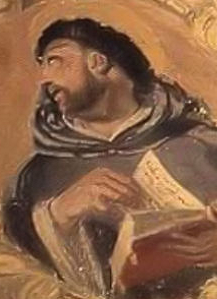William Arnaud (inquisitor)
From Wikipedia, the free encyclopedia
William Arnaud or Guillaume Arnaud [1](died 28 May 1242) was a Dominican inquisitor and martyr.
Blessed William Arnaud O.P. | |
|---|---|
 | |
| Born | Montpellier, France |
| Died | 28 May 1242 Avignonet-Lauragais, Haute-Garonne, France |
| Venerated in | Roman Catholic Church |
| Beatified | 6 September 1866, Saint Peter's Basilica, Papal States by Pope Pius IX |
William was a native of Montpellier.[2] In 1234, Pope Gregory IX named him inquisitor in the dioceses of Agen, Albi, Carcassonne and Toulouse.[3] He was also active with Pierre Seilan in the diocese of Cahors.[4] He was learned in canon law and gained a reputation for zealousness in his inquisitorial duties.[5] He raised enough opposition that he was banished from Toulouse in October 1235 and only allowed back in March 1236 after papal intercession with the count.[6] The Chronicle of Guillaume Pelhisson is an important source for William's inquests, since Pelhisson had access to its now lost records.[7] He appears to have been the most active inquisitor in the region in the 1230s.[8]
On 28 May 1242, William and eleven others were massacred at Avignonet.[9] Their murder was arranged by the bailiff, Raymond of Alfaro, perhaps with the tacit agreement of Count Raymond VII of Toulouse.[10] The murderers themselves came from the castle of Montségur.[8] None of the murderers were ever punished.[11] The Cathars celebrated William's death, even composing songs in Occitan about it, according to an inquisitorial deposition from 1244.[12] The Cathar leader Pierre-Roger de Mirepoix expressed a desire to drink wine from William's skull, had it not been crushed to pieces.[13] The fictionalized but historically based account in the Novas de l'heretje is probably referring to William under the name "Huc Arnaut":[14]
Per quels Prezicadors no se volon cessar, |
These preachers do not wish to stop, |
Catholics reported miracles following the deaths at Avignonet, but it was not until 6 September 1866 that they were beatified by Pope Pius IX.[5] William is listed in the revised Roman Martyrology of 2004, but not in the General Roman Calendar.[10]
Notes
Bibliography
Wikiwand - on
Seamless Wikipedia browsing. On steroids.
